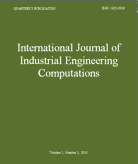1.  |
A discrete firefly meta-heuristic with local search for makespan minimization in permutation flow shop scheduling problems,
, Volume 1, Issue 1, Summer 2010, 1-10. (Number of citations in Scholar: 232 times, Number of citations in Scopus: 158 times, ) Mohammad Kazem Sayadi, Reza Ramezanian and Nader Ghaffari-Nasab |
|
Abstract: During the past two decades, there have been increasing interests on permutation flow shop with different types of objective functions such as minimizing the makespan, the weighted mean flow-time etc. The permutation flow shop is formulated as a mixed integer programming and it is classified as NP-Hard problem. Therefore, a direct solution is not available and meta-heuristic approaches need to be used to find the near-optimal solutions. In this paper, we present a new discrete firefly meta-heuristic to minimize the makespan for the permutation flow shop scheduling problem. The results of implementation of the proposed method are compared with other existing ant colony optimization technique. The preliminary results indicate that the new proposed method performs better than the ant colony for some well known benchmark problems. DOI: 10.5267/j.ijiec.2010.01.001 Keywords:Meta-heuristic, Firefly meta-heuristic, Ant colony, Permutation flow shop, Scheduling, Combinatorial optimization, Mixed integer programming |
|
2.  |
An elitist teaching-learning-based optimization algorithm for solving complex constrained optimization problems
, Pages 535-560 (Number of citations in Scholar: 279 times, Number of citations in Scopus: 192 times,) R. Venkata Rao and Vivek Patel |
|
Abstract: Nature inspired population based algorithms is a research field which simulates different natural phenomena to solve a wide range of problems. Researchers have proposed several algorithms considering different natural phenomena. Teaching-Learning-based optimization (TLBO) is one of the recently proposed population based algorithm which simulates the teaching-learning process of the class room. This algorithm does not require any algorithm-specific control parameters. In this paper, elitism concept is introduced in the TLBO algorithm and its effect on the performance of the algorithm is investigated. The effects of common controlling parameters such as the population size and the number of generations on the performance of the algorithm are also investigated. The proposed algorithm is tested on 35 constrained benchmark functions with different characteristics and the performance of the algorithm is compared with that of other well known optimization algorithms. The proposed algorithm can be applied to various optimization problems of the industrial environment. DOI: 10.5267/j.ijiec.2012.03.007 Keywords: Teaching-learning-based optimization, Elitism, Population size, Number of generations, Constrained optimization problems |
|
3.  |
Meta-heuristics in cellular manufacturing: A state-of-the-art review
,Vol 2 87-122 (Number of citations in Scholar: 81 times, Number of citations in Scopus: 41 times,) Tamal Ghosh, Sourav Sengupta , Manojit Chattopadhyay and Pranab K Dan |
|
Abstract: Meta-heuristic approaches are general algorithmic framework, often nature-inspired and designed to solve NP-complete optimization problems in cellular manufacturing systems and has been a growing research area for the past two decades. This paper discusses various meta-heuristic techniques such as evolutionary approach, Ant colony optimization, simulated annealing, Tabu search and other recent approaches, and their applications to the vicinity of group technology/cell formation (GT/CF) problem in cellular manufacturing. The nobility of this paper is to incorporate various prevailing issues, open problems of meta-heuristic approaches, its usage, comparison, hybridization and its scope of future research in the aforesaid area. DOI: 10.5267/j.ijiec.2010.04.005 Keywords: Meta-heuristic, Cell formation, Group technology, Evolutionary algorithms, Survey, Review |
|
4.  |
Jaya: A simple and new optimization algorithm for solving constrained and unconstrained optimization problems,
Volume 7, Issue 1, July 2016, 19-34. (Number of citations in Scholar: 102 times, Number of citations in Scopus: 48 times,) Venkata Rao, R. |
5.  |
An empirical study of Iranian regional airports using robust data envelopment analysis,
Volume 1, Issue 1, July 2010, 65-72. (Number of citations in Scholar: 38 times, Number of citations in Scopus: 13 times,) Emad Roghanian and Amin Foroughi |
|
Abstract:Data Envelopment Analysis (DEA) has been one of the most important tools on measuring the relative efficiency of different similar units such as transportation systems using terminals, airports, etc. In this study, we perform an empirical analysis on Iranian airports based on DEA methods to measure the efficiencies of various airports. One of the primary issues on many traditional DEA methods is that the data are almost always contaminated with noise. We use a DEA method which could handle the uncertainty associated with input and output data. The results of this comprehensive study show that most of the active airlines are practically inefficient and the government could significantly increase the efficiencies of the airports by setting new regulations and rules. DOI: 10.5267/j.ijiec.2010.01.006 Keywords:Robust Optimization, DEA, Efficiency , Airport Transportation, Economic Scale |
|
6.  |
Artificial Bee colony for resource constrained project scheduling problem
, 45-60 (Number of citations in Scholar: 33 times, Number of citations in Scopus: 23 times,) Reza Akbari, Vahid Zeighami and Koorush Ziarati |
|
Abstract:Solving resource constrained project scheduling problem (RCPSP) has important role in the context of project scheduling. Considering a single objective RCPSP, the goal is to find a schedule that minimizes the makespan. This is NP-hard problem (Blazewicz et al., 1983) and one may use meta-heuristics to obtain a global optimum solution or at least a near-optimal one. Recently, various meta-heuristics such as ACO, PSO, GA, SA etc have been applied on RCPSP. Bee algorithms are among most recently introduced meta-heuristics. This study aims at adapting artificial bee colony as an alternative and efficient optimization strategy for solving RCPSP and investigating its performance on the RCPSP. To evaluate the artificial bee colony, its performance is investigated against other meta-heuristics for solving case studies in the PSPLIB library. Simulation results show that the artificial bee colony presents an efficient way for solving resource constrained project scheduling problem. DOI: 10.5267/j.ijiec.2010.04.004 Keywords: Meta-heuristic, Artificial bee colony, Resource constrained project scheduling, Makespan, Single mode |
|
